(Reading, that is). Apparently, if you do, you'd be in good company. Recent Guilty Secrets survey (Apparently carried out by the UK organisation 'Spread the Word' as part of the lead up to National Book Day) reveals that 65% of respondents have lied about reading a book. (Erm, just to clarify, not lied about ever having read a book - that would be extra scary - I mean lied about having read a particular book).
And what are we pretending to read? Well, poor George would be turning in his 'doesn't anyone in this world understand irony' grave, because it's, dada, yes, 1984. Apparently 42% of people have lied about reading that one. Not that his dystopic view of dumbed down centrally controlled simpletons with a loose hold on truth has come true or anything (she says sweetly without any hint of malice).
Shortly followed by
2. War and Peace by Leo Tolstoy (31%)
3. Ulysses by James Joyce (25%)
4. The Bible (24%)
5. Madame Bovary by Gustave Flaubert (16%)
6. A Brief History of Time by Stephen Hawking (15%)
7. Midnight’s Children by Salman Rushdie (14%)
8. In Remembrance of Things Past by Marcel Proust (9%)
9. Dreams from My Father by Barack Obama (6%)
10. The Selfish Gene by Richard Dawkins (6%)
I can happily admit to not having read 2, having read 3 chapters of 3, random quotes from 4, nothing of 5-9, and actually not being able to remember if I've read #10 (Bsharp can you jog my memory - was that uni reading?). I did read 1984, but jeez it was a long time ago and I think I had to for school.
And if you do sometimes fake it, what really turns you on?
The Guardian reporting on the same survey says that when asked to name the writers they really enjoyed, 61% of people ticked JK Rowling and 32% John Grisham. I guess my guilty pleasure mystery novels (Chandler, Rankin, Grafton, Evanovich, McCall Smith and others)are on par with Rowling and Grisham. I really enjoy them for the 4 minutes it takes to read them, but does that mean I enjoy them the most out of everything I read? Or are books like lovers, and sometimes the ones that take longer to get there and are more unusual, surprising and multifaceted, awkward, challenging even, end up being the ones that change you, that linger on your mind?
Sunday, March 15, 2009
Tuesday, March 10, 2009
kids books
I was sad to read last week that Kilmeny Niland had died. As a kid, I had quite a few books illustrated by her and her twin sister Deborah*, most memorably Tell me a Tale, Haunts and Taunts, and Pancakes and Painted Eggs. These books were quite thick and full of a variety of stories, factual articles about traditions around the world, songs and poems, all with imaginative illustrations.
Some kids books stay in your mind all your life. Here are some of my favourite books from childhood that I still have (click to embiggen the pictures).
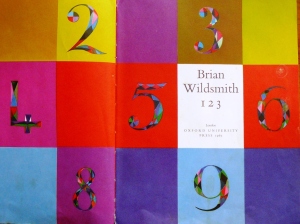


1,2,3: this was actually my brother’s book, but I always loved and still love the graphic design by Brian Wildsmith. The simplicity and the rich colours are beautiful.
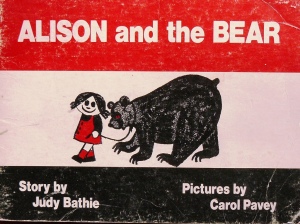


Alison and the Bear: obviously I liked this one because it was about me! Or if not me, another little girl called Alison, who, despite everyone saying she can’t do it, goes out and captures a bear, using only peanut butter sandwiches. It has wonderful simple crayon-y illustrations that are very effective despite being mostly back and white. I only recently noticed that on the back, it notes that “This is a non-sexist children’s book, published by the Women's Movement Children's Literature Co-Operative”. Strange to think there was a time when an effort had to be made (though maybe with princess culture reasserting itself, it’s time for another round).
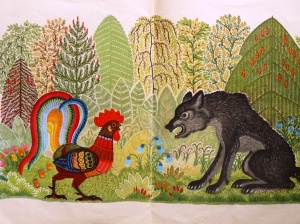


The Cock with the Golden Comb: this was one of four books that I had which were published in the USSR. They were about A4 sized and printed on cheap paper with no covers, and the back page was all in Russian. I have no idea how we got them. The writing was a bit stilted and had the quality of being a literal rather than literary translation. But as you can see, the illustrations were fantastic. The Cock with the Golden Comb one is a retelling of a singing rooster that is able to produce cakes and bread from a magical hand mill, and thereby brings good fortune and plenty to eat to a young brother and sister, and saves them from the wicked tsar.
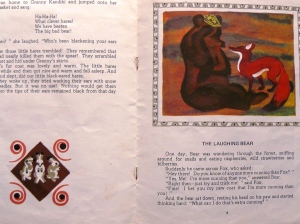
Another of these Soviet books was Life with Granny Kandiki : traditional stories from the far north of Russia, about talking bears, ravens that rescued babies, and why arctic hares have black tips on their ears, amongst other things.
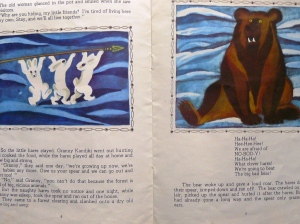
My favourite of the Soviet books was The Brave Ant. Unfortunately I’ve lost this one, it had the grooviest illustrations of them all (think lots of green and tan and lime-yellow, and big loopy-psychedelic pictures of stylised ants). It was also the most propaganda-esque – it was all about the virtues of collectivism and how the ants working together managed to save the ant colony from being washed away by a flood. The ants called each other Comrade.
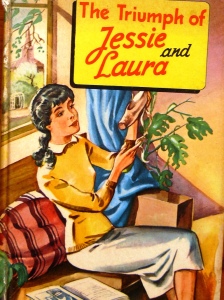
The Triumph of Jessie and Laura: this was given to my mum for her 10th birthday. It’s one of many in the genre of ‘plucky orphan girl dreams of being ballerina, suffers many setbacks, fate intervenes and makes her A Star!” That genre seems to have completely died – maybe ballet’s not such a popular vehicle for stardom in the age of Australia Idol? Or perhaps orphans aren’t as cool as they used to be? From memory, Jessie was the dancer and Laura wanted to be a writer. Laura also had consumption so spent a lot of time lying about coughing and bravely sacrificing her writerly earnings for ballet shoes instead of spending them on medicine. There was also some sort of wicked uncle and a kindly old anonymous gentleman who married Laura at the end. In fact, this is why the Non-Sexist Children's book was invented.
What were your favourite books as a kid?
*Australian literary trivia #7692: Deborah and Kilmeny Niland are the daughters of writers Ruth Park (The Harp in the South) and D’Arcy Niland (The Shiralee).
Some kids books stay in your mind all your life. Here are some of my favourite books from childhood that I still have (click to embiggen the pictures).



1,2,3: this was actually my brother’s book, but I always loved and still love the graphic design by Brian Wildsmith. The simplicity and the rich colours are beautiful.



Alison and the Bear: obviously I liked this one because it was about me! Or if not me, another little girl called Alison, who, despite everyone saying she can’t do it, goes out and captures a bear, using only peanut butter sandwiches. It has wonderful simple crayon-y illustrations that are very effective despite being mostly back and white. I only recently noticed that on the back, it notes that “This is a non-sexist children’s book, published by the Women's Movement Children's Literature Co-Operative”. Strange to think there was a time when an effort had to be made (though maybe with princess culture reasserting itself, it’s time for another round).



The Cock with the Golden Comb: this was one of four books that I had which were published in the USSR. They were about A4 sized and printed on cheap paper with no covers, and the back page was all in Russian. I have no idea how we got them. The writing was a bit stilted and had the quality of being a literal rather than literary translation. But as you can see, the illustrations were fantastic. The Cock with the Golden Comb one is a retelling of a singing rooster that is able to produce cakes and bread from a magical hand mill, and thereby brings good fortune and plenty to eat to a young brother and sister, and saves them from the wicked tsar.

Another of these Soviet books was Life with Granny Kandiki : traditional stories from the far north of Russia, about talking bears, ravens that rescued babies, and why arctic hares have black tips on their ears, amongst other things.

My favourite of the Soviet books was The Brave Ant. Unfortunately I’ve lost this one, it had the grooviest illustrations of them all (think lots of green and tan and lime-yellow, and big loopy-psychedelic pictures of stylised ants). It was also the most propaganda-esque – it was all about the virtues of collectivism and how the ants working together managed to save the ant colony from being washed away by a flood. The ants called each other Comrade.

The Triumph of Jessie and Laura: this was given to my mum for her 10th birthday. It’s one of many in the genre of ‘plucky orphan girl dreams of being ballerina, suffers many setbacks, fate intervenes and makes her A Star!” That genre seems to have completely died – maybe ballet’s not such a popular vehicle for stardom in the age of Australia Idol? Or perhaps orphans aren’t as cool as they used to be? From memory, Jessie was the dancer and Laura wanted to be a writer. Laura also had consumption so spent a lot of time lying about coughing and bravely sacrificing her writerly earnings for ballet shoes instead of spending them on medicine. There was also some sort of wicked uncle and a kindly old anonymous gentleman who married Laura at the end. In fact, this is why the Non-Sexist Children's book was invented.
What were your favourite books as a kid?
*Australian literary trivia #7692: Deborah and Kilmeny Niland are the daughters of writers Ruth Park (The Harp in the South) and D’Arcy Niland (The Shiralee).
Friday, March 06, 2009
New book - Expressway
Those of you who are interested in analyzing or critiquing fossil-fuel-
based economies and ecologies may be interested in Sina Queyras's
brand new book EXPRESSWAY. This is a book I heard about on a Canadian list about literature and the environment.
I don't know Sina Queyra's work but it seems like she is a well regarded Canadian postmodern poet who consistently engages with interesting eco-social issues.
And... this book has a trailer! Maybe heaps of books do these days but to be honest I'd never seen one before now. Gotta love the music too - aaah acca dacca.
I think this is her blog.
(NB has mildly disturbing images - maybe steer clear if you've been involved in a horrific auto-accident)
based economies and ecologies may be interested in Sina Queyras's
brand new book EXPRESSWAY. This is a book I heard about on a Canadian list about literature and the environment.
I don't know Sina Queyra's work but it seems like she is a well regarded Canadian postmodern poet who consistently engages with interesting eco-social issues.
And... this book has a trailer! Maybe heaps of books do these days but to be honest I'd never seen one before now. Gotta love the music too - aaah acca dacca.
I think this is her blog.
(NB has mildly disturbing images - maybe steer clear if you've been involved in a horrific auto-accident)
Thursday, March 05, 2009
Well booklub has been progressing while I've been online elsewhere! Thought it might be a good time to do a summary of recent winter reading. Going on Miss J's theme, of the 'accidental book club' the first three are examples, of books that have just floated to me from saying to people (or them saying to me) can you lend me a book? Whatever you can spare, I'm going to cross the ocean so you might not get it back. You don't get really treasured reads that way, but you get sort of zeitgeist, recent stuff and just randoms too. In this way, we have a kind of informal book club among some greenpeace women. Basically a habit we're getting of circulating whatever books we buy amongst three or four chicks, as all of us are somewhat temporary residents in Europe. Then we sometimes talk about them in the pub.
The Reader (now a film with Kate Winslett in an oscar winning role) -Bernard Schillink. (from Cindy) This is a very quick read, quite engaging, and moves from a kind of risque love story from the first-person perspective of a young German school boy, to something else entirely. I think I'd still like to see the film, and my guess is they might tell the narrative in a different order, using flashback, which would be interesting. I found it very poignant and touching towards the end. It contains a sequence where two people have a connection only through letters for a period of time, which was particularly bitter-sweet for me, having experienced that somewhat.
Elizabeth Costello by JM Coetzee. (from the Christian)
Coetzee is very big in Australia I think, and has won a Nobel for literature. This book is more like a collection of long-ish essays, but put into the mouth of this fictional writer, Costello. I think JM is a man, and I generally like it when writers create a character of the opposite gender. In this book, the protagonist has won prestigious awards, and has an international following. In parts it left me a bit cold and thinking "what?, why has this narrative swerved off onto a long and somewhat scholarly discussion of vegetarianism, and what happened to the son who was just there a minute ago?". It's like Coetzee's using this book more as a clever thought-exercise than to convey a real story, and it is stretched a bit thin in some parts. Also, I didn't understand every reference so I got the feeling you just had to be more well read in the classics to really feel satisfied on all levels its operating. Jade, you might enjoy the exploration of ideas about animals and humans and their place in the world, as stand-along pieces - perhaps in extract!
White Tiger by Aravind Adiga (also from Cindy)
Won the Man booker prize last year. Indian writers who show us western culture against and eastern sensibility have been pretty popular (at least on my bookshelf!) for a few years. Zadie Smith's White teeth is one of my favourites and I've also enjoyed Buddha of Suburbia, Hari Kunzru's Transmission, God of Small things, and more. Actually I'm constantly trying to pick books that aren't actually about a middle class, 20th century, white woman or man in US/ UK or Australia. Can be tough at times. This one hasn't left such a lasting impression for me as those ones that come straight to mind. It's pretty bleak, about a guy raised in rural India and his quest to do better for himself, I think he ends up in Mumbai. Most of it is about the lead up to life-changing situation, I would say you could sum it up as an experience of total corruption, that then sets him on the path to being "successful." There's plenty to think about while you're reading, what is success really, what is it like to feel locked into a pre-determined life of obligations and duty. The main character suffers a whole lot of humiliations and defeats in the first part. He holds himself apart from others around himself, always wanting to be above them, incorruptible in a way. There's plenty of sly humour, and it pushes a couple of boundaries, like all good tales. But it's a fairly straightforward book - not sure if I'd put it in the big super-star awards category. But then I don't have to read and pick from the whole shortlist either!
Current: The Eternal Frontier - Tim Flannery (from the discount shop in Amsterdam)
Reading books like this is a bit 'back to my roots' of straight ecology - hundreds of pages of at times almost boring descriptions of waves of animal and plant evolution across the American continent. Tim has a kind of scientific sub-text though.. the growing weight of evidence that arrival of humans can dramatically alter a continent's fauna and environment, through intense hunting. Weirdly this is quite a controversial proposition amongst some circles, and that may be holding us back from actually recognising that we've (cough) -fucked the climate-! Anyway, this one is more a 'straight' monograph so far, on the creation of the plants, animals and people who inhabited America, up to Columbus's arrival in 1492. But throughout all his writing he wants to add the idea that humans can radically alter their environment, they are not just products of it - not so strange really, but somehow anathema to some branches of technology and science. Loving the geeky stuff about paleo-megafauna, also just getting into the section on evolution of cultures too.
Me talk pretty one day - David Sedaris (from the discount shop in Sydney)
Had high hopes for this one, got it second hand, saved it up for the plane ride home. I found his book "Dress your children in corduroy and denim" hilarious and just so 'out there' as he shared the more ridiculous sides of his own up-bringing. This book was written before that one, and was more self-conscious, less laugh-out-loud funny. Still worth a go while travelling, but I wouldn't bother buying if I were you.
The Reader (now a film with Kate Winslett in an oscar winning role) -Bernard Schillink. (from Cindy) This is a very quick read, quite engaging, and moves from a kind of risque love story from the first-person perspective of a young German school boy, to something else entirely. I think I'd still like to see the film, and my guess is they might tell the narrative in a different order, using flashback, which would be interesting. I found it very poignant and touching towards the end. It contains a sequence where two people have a connection only through letters for a period of time, which was particularly bitter-sweet for me, having experienced that somewhat.
Elizabeth Costello by JM Coetzee. (from the Christian)
Coetzee is very big in Australia I think, and has won a Nobel for literature. This book is more like a collection of long-ish essays, but put into the mouth of this fictional writer, Costello. I think JM is a man, and I generally like it when writers create a character of the opposite gender. In this book, the protagonist has won prestigious awards, and has an international following. In parts it left me a bit cold and thinking "what?, why has this narrative swerved off onto a long and somewhat scholarly discussion of vegetarianism, and what happened to the son who was just there a minute ago?". It's like Coetzee's using this book more as a clever thought-exercise than to convey a real story, and it is stretched a bit thin in some parts. Also, I didn't understand every reference so I got the feeling you just had to be more well read in the classics to really feel satisfied on all levels its operating. Jade, you might enjoy the exploration of ideas about animals and humans and their place in the world, as stand-along pieces - perhaps in extract!
White Tiger by Aravind Adiga (also from Cindy)
Won the Man booker prize last year. Indian writers who show us western culture against and eastern sensibility have been pretty popular (at least on my bookshelf!) for a few years. Zadie Smith's White teeth is one of my favourites and I've also enjoyed Buddha of Suburbia, Hari Kunzru's Transmission, God of Small things, and more. Actually I'm constantly trying to pick books that aren't actually about a middle class, 20th century, white woman or man in US/ UK or Australia. Can be tough at times. This one hasn't left such a lasting impression for me as those ones that come straight to mind. It's pretty bleak, about a guy raised in rural India and his quest to do better for himself, I think he ends up in Mumbai. Most of it is about the lead up to life-changing situation, I would say you could sum it up as an experience of total corruption, that then sets him on the path to being "successful." There's plenty to think about while you're reading, what is success really, what is it like to feel locked into a pre-determined life of obligations and duty. The main character suffers a whole lot of humiliations and defeats in the first part. He holds himself apart from others around himself, always wanting to be above them, incorruptible in a way. There's plenty of sly humour, and it pushes a couple of boundaries, like all good tales. But it's a fairly straightforward book - not sure if I'd put it in the big super-star awards category. But then I don't have to read and pick from the whole shortlist either!
Current: The Eternal Frontier - Tim Flannery (from the discount shop in Amsterdam)
Reading books like this is a bit 'back to my roots' of straight ecology - hundreds of pages of at times almost boring descriptions of waves of animal and plant evolution across the American continent. Tim has a kind of scientific sub-text though.. the growing weight of evidence that arrival of humans can dramatically alter a continent's fauna and environment, through intense hunting. Weirdly this is quite a controversial proposition amongst some circles, and that may be holding us back from actually recognising that we've (cough) -fucked the climate-! Anyway, this one is more a 'straight' monograph so far, on the creation of the plants, animals and people who inhabited America, up to Columbus's arrival in 1492. But throughout all his writing he wants to add the idea that humans can radically alter their environment, they are not just products of it - not so strange really, but somehow anathema to some branches of technology and science. Loving the geeky stuff about paleo-megafauna, also just getting into the section on evolution of cultures too.
Me talk pretty one day - David Sedaris (from the discount shop in Sydney)
Had high hopes for this one, got it second hand, saved it up for the plane ride home. I found his book "Dress your children in corduroy and denim" hilarious and just so 'out there' as he shared the more ridiculous sides of his own up-bringing. This book was written before that one, and was more self-conscious, less laugh-out-loud funny. Still worth a go while travelling, but I wouldn't bother buying if I were you.
Labels:
Australian,
Book swap,
evolution,
love,
On reading,
On writing
Subscribe to:
Comments (Atom)